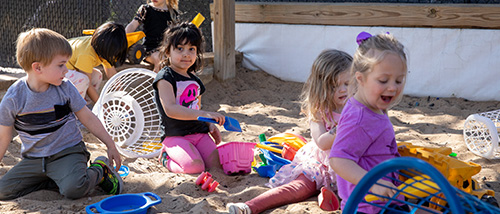The University School for Young Children values our student’s families and is committed to giving them updated information. Here you can find information on our curriculum, visitor policy, ways to get involved, communications, and our care of children with special needs.
Curriculum
At the University School for Young Children, we believe children are competent and full of rich potential. We believe our trust in children’s eagerness to learn and their abilities to do so best equips us to guide them as they seek knowledge and understanding. We offer a high-value curriculum that uses The Creative Curriculum in conjunction with other tools and philosophies that are grounded in child development research and theory and the Missouri Pre-K Standards for preschool children. The USYC focuses on four types of learning (Katz):
- Knowledge and understanding
- Skills
- Dispositions or approaches to learning
- Feelings
We recognize children need to develop an understanding of basic concepts and facts (knowledge), as well as develop skills necessary for physical growth, reading, math, science, social studies, and other areas of learning. They must also develop approaches to learning, such as asking questions, being persistent in tasks, and using problem-solving skills to be successful over a lifetime. In addition, we must focus on feelings to help children develop a strong sense of self that builds confidence, guide them as they interact with others, and create competence and a caring attitude toward others.
Our teachers engage daily in ongoing assessments. They find out what children care about, what they know and what they can do by observing, as well as sharing and discussing information with families. This knowledge is used to build a curriculum that engages the children with the optimum level of challenge.
We consider strong relationships between family and school a key part of our curriculum. It is through the trust between the teacher and family that the child feels comfortable to explore and try new experiences. The classrooms offer predictable daily routines, allowing the child to become secure and fostering the development of new relationships with adults and peers. As the children feel safe, they can engage in learning and make new discoveries that lead to deeper knowledge and the development of new skills.
Visitor Policy
The University School for Young Children has an “open door” policy for parents and other authorized visitors. Parents and guardians are always welcome to observe and participate in their child’s day at the school. Visitors conducting approved observations or participating in field experiences must sign the guestbook in the office, obtain a visitor’s badge, and be escorted to the classroom.
Get Involved!
Parents are always welcome participants in the program. You are invited to visit or observe your child’s classroom at any time. You are also encouraged to participate in your child’s classroom. We love to have families share their talents. For instance, in the past, parents have worked with the children by planting the garden or by bringing in the family pet for a visit. Others have shared their interests in art or music with the children. The possibilities and opportunities are endless. We encourage you to talk with your child’s teacher or the director about ways that you might be involved.
Communications
The teachers and staff at the USYC partner with families to support positive development and learning. As part of this partnership, family communication is a priority. There are many ways in which we seek to communicate with families.
Informal Conversation
Teachers are available to talk to parents informally at the beginning and end of each day. Please take advantage of this time to share information and concerns or to ask questions about your child.
Written Communication
A school newsletter and other communication from your child’s teacher will be posted in the classroom or emailed throughout the school year.
Parent Bulletin Board
Throughout the school, parents will notice parent bulletin boards. Menus, curriculum outlines, and other information about your child’s classroom and the program can be found on parent bulletin boards.
Parent-Teacher Conferences
Conferences between parents and teachers lead to a better understanding between school and home. Teachers schedule conferences with parents twice a year. Additional conferences may be scheduled upon request.Documentation Boards
Teachers regularly document a child’s learning experience at the school with artwork, pictures, or journaling. This information is often displayed on the walls. Parents are encouraged to stop and review these displays with their children.
Children with Special Needs
The University School for Young Children recognizes that all children are different and strives to meet these needs. We welcome children with special needs as part of our mission to serve the community and to educate university students to work with children in an inclusive environment. As partners with parents in supporting child development, teachers work closely with parents to meet all the needs of the child. If a teacher believes that a child might need additional assistance outside of the realm of the school program, parents will be contacted and a dialogue established to discuss concerns and strategies. Parents will be referred to community resources as needed. Our teachers have experience working with special education professionals and, at the parents' request, are willing to attend and assist with individualized education plan meetings. We also welcome other professionals who are providing services to our children who have special needs and who would like to help assist in the classroom setting.
